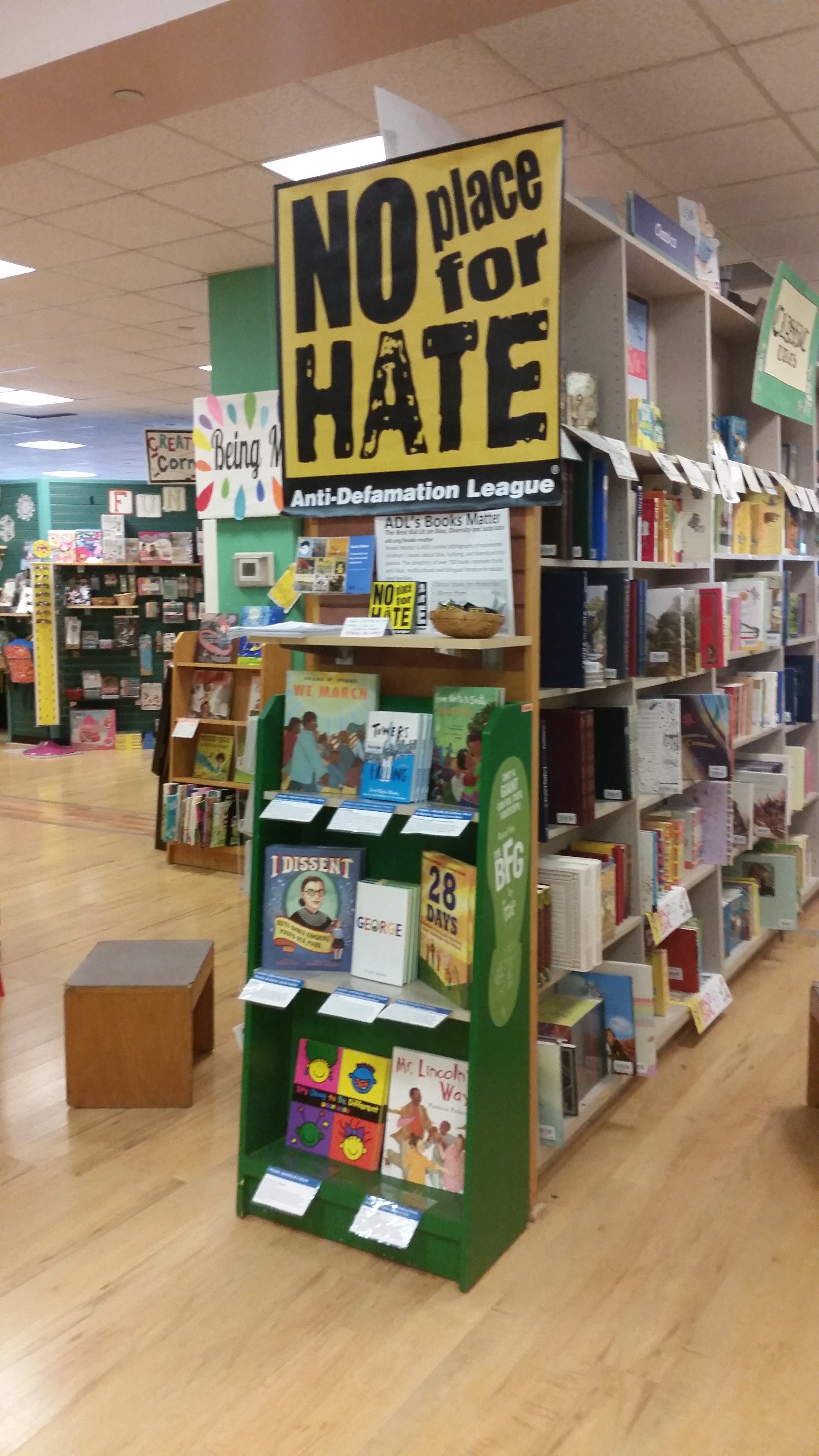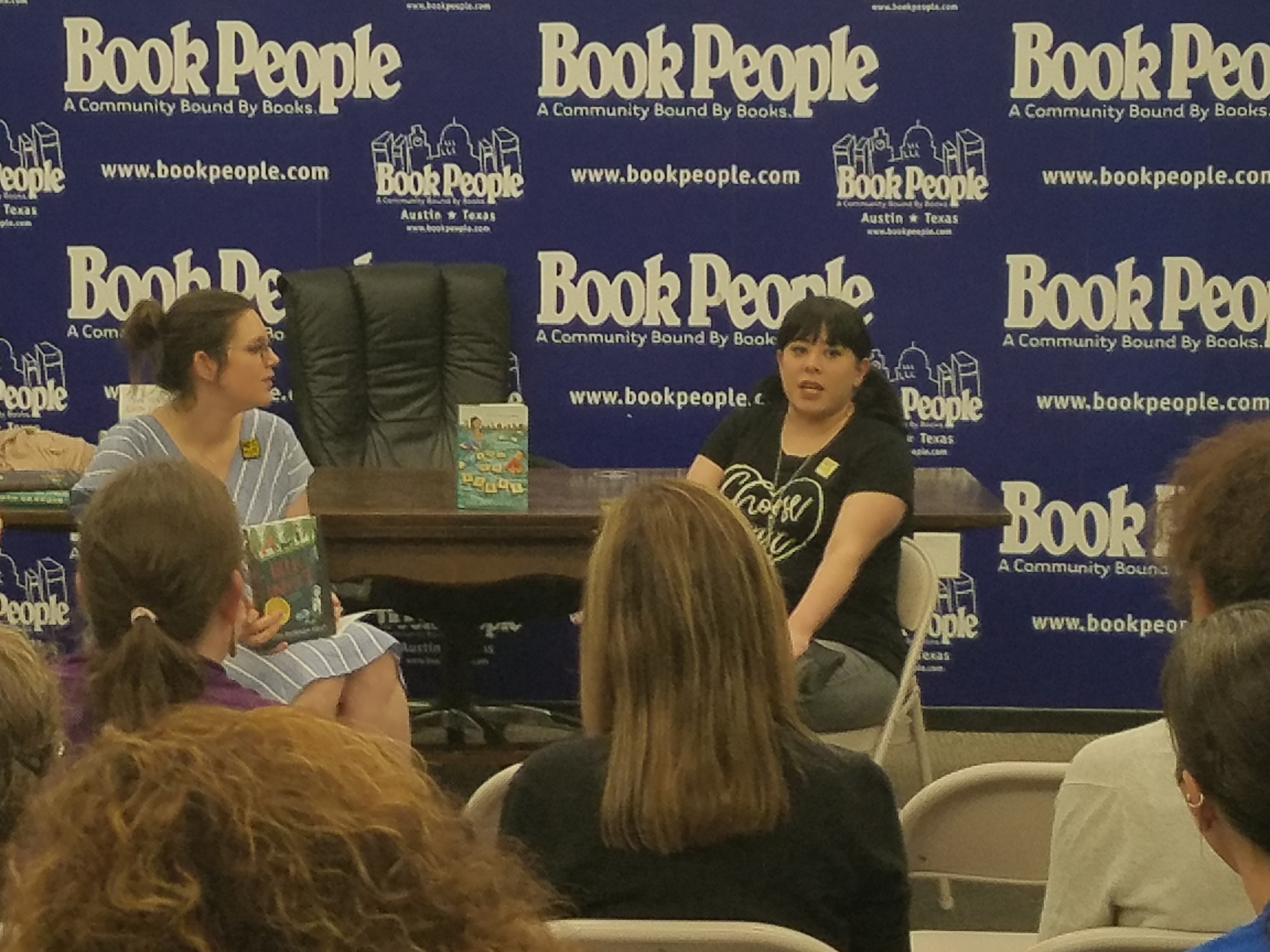
ADL’s curated No Place for Hate display in our store.
I wrote last year about partnering with the Austin chapter of the Anti-Defamation League to foster discussions about anti-bias and inclusivity. Since 2004, Austin schools have been implementing the Anti-Defamation League’s No Place for Hate® initiative, working together to challenge biases and pre-conceptions to help kids see themselves and each other with empathy. ADL has also done a lot of work to champion the idea that “books have the potential to create lasting impressions” through their Books That Matter program, a terrific book list we promote in-store. One of the books they have recently added to their recommendation list for topics of ability, disability, and ableism is Hello, Universe by Erin Entrada Kelly, which of course was recently honored with the Newbery Medal. So when we learned that Erin Entrada Kelly was coming to Austin for school visits, it seemed like a perfect opportunity to invite educators to join us for a directed discussion between Erin and ADL Austin’s education director, Jillian Bontke.
When thinking about the role of booksellers in these conversations, I often come back to the idea of creating space—creating space for discovery, for new ideas, for interesting voices, for dialogue. But I think we have also to ask ourselves: once you have created space for these conversations, how do you keep making sure it’s a safe space for all? That’s the kind of question that the No Place for Hate® program challenges us all to think about. What resulted from yesterday’s event was a remarkable, candid talk about the challenge of overcoming our own biases, the power of interconnectivity, the influence of role models, and the importance of being seen and heard.
 A kid who grew up bullied for and embarrassed about being different from the kids around her, Erin talked a lot about the ways that Virgil’s journey in Hello, Universe reflects her own. His is a small social circle anchored by one best friend and his Lola—his loving, unforgettable Filipina grandmother who’s full of stories to help him navigate the world. Erin said while she spent years turning away from her mother’s stories from the Philippines, she now looks back and appreciates what her mother passed on. So through Virgil’s warm and totally delightful relationship with Lola, she expressed the hope that other Asian or Filipino kids might see positive reflections of their own families and embrace the value of those traditions and identities sooner than she did.
A kid who grew up bullied for and embarrassed about being different from the kids around her, Erin talked a lot about the ways that Virgil’s journey in Hello, Universe reflects her own. His is a small social circle anchored by one best friend and his Lola—his loving, unforgettable Filipina grandmother who’s full of stories to help him navigate the world. Erin said while she spent years turning away from her mother’s stories from the Philippines, she now looks back and appreciates what her mother passed on. So through Virgil’s warm and totally delightful relationship with Lola, she expressed the hope that other Asian or Filipino kids might see positive reflections of their own families and embrace the value of those traditions and identities sooner than she did.The dramatic core of the novel turns around Virgil’s encounter with a bully and its aftermath, but the story also belongs to Kaori, Valencia, and Chet. While the character of Virgil speaks most directly to Erin’s own experience, and kids apparently most often say best friend Kaori is their favorite (she IS psychic after all), Erin actually ended up reflecting a lot about the challenges of writing both Valencia and Chet. As a deaf character, Valencia offers a set of “how-tos” throughout the book to help people talk to her. “Face me, don’t cover your mouth, and speak clearly.” She’s developed these tips to help navigate a world full of people who don’t communicate like she does. But since Valencia’s a character who is deaf, and Erin is a writer who is not, Jillian asked Erin to talk a little bit about where those how-tos came to be. The interesting answer was that they came from facing some biases she didn’t know she had.
She had reached out to someone she felt would be a resource in understanding the deaf experience only to discover right off the bat that she was nervous talking face-to-face without knowing ASL. So she voiced her worries and was given some basic how-tos. Through the
 development of that relationship, Erin shared that she was able to ask sometimes uncomfortable questions like “what do your hearing aids feel like and what do you hear?” that helped her go back and write Valencia from a place of greater understanding and empathy. The fear of letting yourself be vulnerable and admit that you don’t know the right thing—or even worse that you have been thinking a wrong thing—is very real. It can be terrifying. But that’s how you learn. Facing that fear and turning it into dialogue and empathetic understanding is one of things Jillian Bontke and the educators in this room all work so hard to do. And using the experiences of characters like Valencia and Virgil as a jumping off point for discussion can help prompt honest conversations in ways that feel less intimidating to kids than asking them to speak about themselves.
development of that relationship, Erin shared that she was able to ask sometimes uncomfortable questions like “what do your hearing aids feel like and what do you hear?” that helped her go back and write Valencia from a place of greater understanding and empathy. The fear of letting yourself be vulnerable and admit that you don’t know the right thing—or even worse that you have been thinking a wrong thing—is very real. It can be terrifying. But that’s how you learn. Facing that fear and turning it into dialogue and empathetic understanding is one of things Jillian Bontke and the educators in this room all work so hard to do. And using the experiences of characters like Valencia and Virgil as a jumping off point for discussion can help prompt honest conversations in ways that feel less intimidating to kids than asking them to speak about themselves.For me as a reader, one of the most impressive achievements of Hello, Universe is the sense of understanding and empathy that extends to each one of its characters—including the bully lurking in the woods. It’s that undercurrent of empathy that makes the book feel so nuanced. So I was very interested to hear Erin talk about her reluctance as someone who was bullied to let herself feel sympathy for Chet “The Bull” Bullen. Despite that hesitation, Chet never feels one-dimensional. Erin lets kids see that Chet’s father’s bullying of him has left Chet desperate for approval, seeking power and influence the only way he knows how. But of course Chet is not the one proven powerful in the woods on this particular day. On this day, in fact, the universe has other plans entirely.
Erin stressed that she very much wants the character of Virgil to speak to the strength of the underdog, the quiet or more sensitive boys, maybe the ones who don’t see themselves reflected as often in the stories they read or see on the screen. And for kids like Valencia who ever stare at their ceiling wondering if anyone else feels so utterly alone, she wants them to see there are others out there too. After all, even if you feel lonely today, you might just make a brand-new friend tomorrow. You never know what—or who—the universe is going to send your way.
